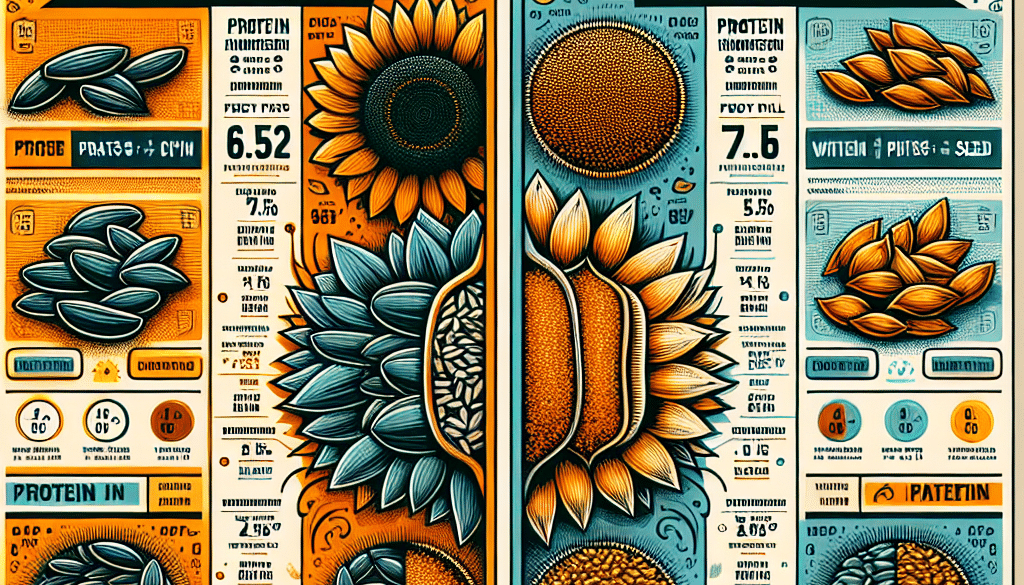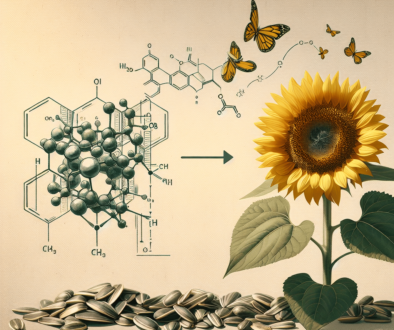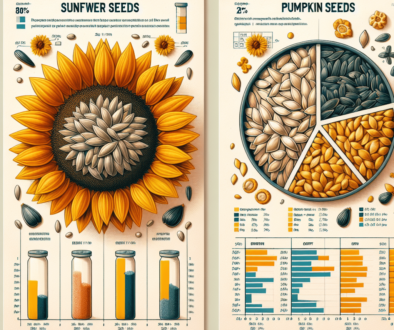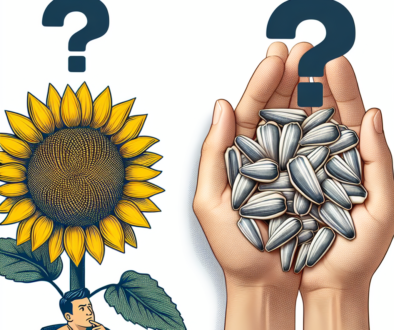Seeds Protein Comparison: Sunflower vs Pumpkin
-
Table of Contents
- Seeds Protein Comparison: Sunflower vs Pumpkin
- Introduction to Seed Proteins
- Nutritional Overview of Sunflower Seeds
- Nutritional Overview of Pumpkin Seeds
- Protein Quality and Amino Acid Profiles
- Sunflower Seed Amino Acid Profile
- Pumpkin Seed Amino Acid Profile
- Health Benefits of Sunflower and Pumpkin Seeds
- Health Benefits of Sunflower Seeds
- Health Benefits of Pumpkin Seeds
- Comparative Analysis of Protein Content
- Use in Dietary Patterns
- Environmental Impact and Sustainability
- Conclusion: Sunflower vs Pumpkin Seed Protein
- Discover ETprotein’s High-Quality Seed Proteins
Seeds Protein Comparison: Sunflower vs Pumpkin
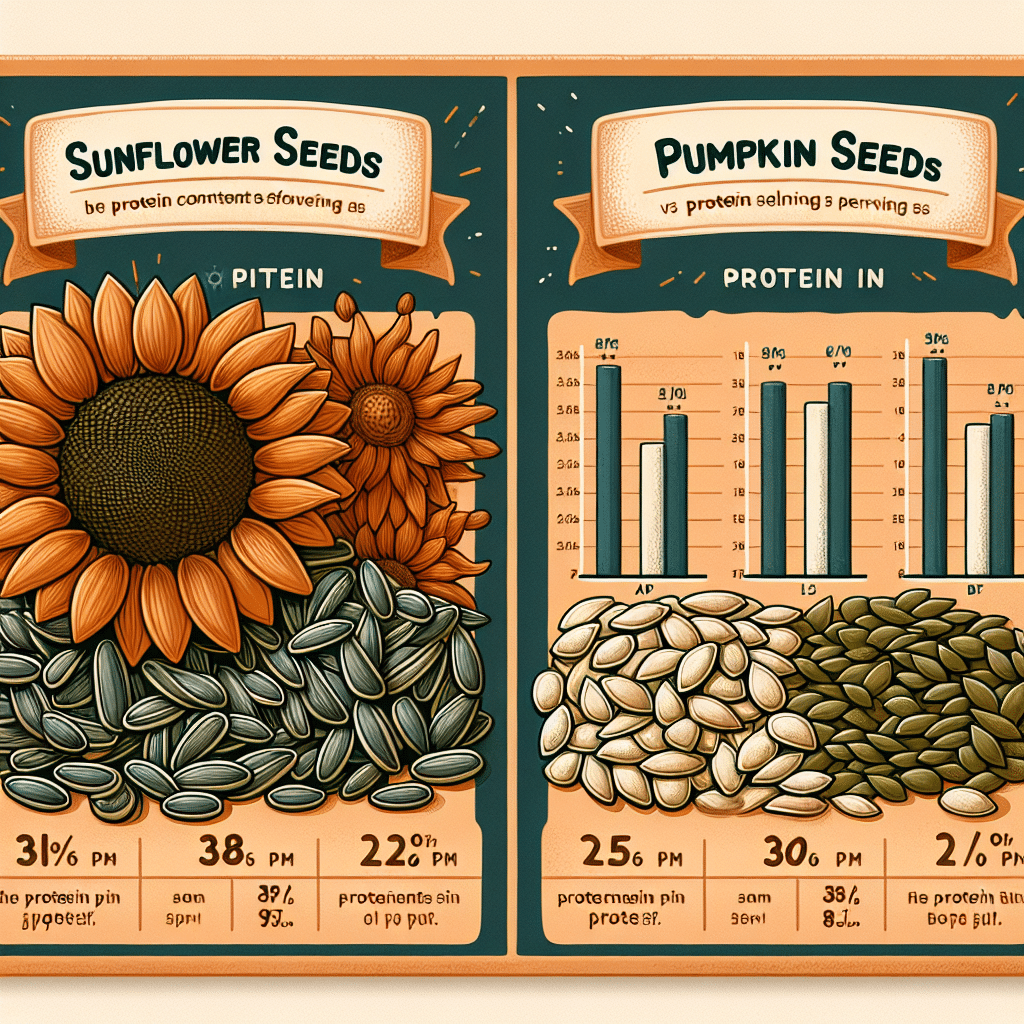
Seeds are a nutritional powerhouse, offering a variety of health benefits, including a high content of protein. Among the plethora of seeds available, sunflower and pumpkin seeds stand out for their impressive protein profiles. This article delves into a comprehensive comparison of these two popular seeds, examining their protein content, amino acid profiles, health benefits, and potential uses in various diets.
Introduction to Seed Proteins
Proteins are essential macronutrients required for the building, maintenance, and repair of tissues in the body. Seeds are not only a source of healthy fats and fiber but also a rich source of plant-based protein, making them an excellent dietary addition for those looking to increase their protein intake without consuming animal products.
Nutritional Overview of Sunflower Seeds
Sunflower seeds, derived from the beautiful sunflower plant, are a popular snack and ingredient in various dishes. They are particularly known for their high protein content, which varies depending on whether they are consumed shelled or unshelled. A typical serving of shelled sunflower seeds (about 1/4 cup) can provide around 6-7 grams of protein.
- Rich in Vitamin E and B vitamins
- Contains essential minerals such as magnesium, selenium, and zinc
- High in healthy unsaturated fats
- Good source of dietary fiber
Nutritional Overview of Pumpkin Seeds
Pumpkin seeds, also known as pepitas, are another nutrient-dense seed. They are often consumed roasted and can be found in both shelled and unshelled forms. Similar to sunflower seeds, a 1/4 cup serving of pumpkin seeds provides approximately 8-10 grams of protein, making them slightly higher in protein content than sunflower seeds.
- Excellent source of zinc, which supports immune function
- Contains antioxidants like carotenoids and vitamin E
- Provides magnesium, which is important for heart health
- Rich in iron and phosphorus
Protein Quality and Amino Acid Profiles
When evaluating the quality of protein sources, it’s essential to consider their amino acid profiles. Amino acids are the building blocks of proteins, and nine of them are considered essential because the body cannot produce them on its own.
Sunflower Seed Amino Acid Profile
Sunflower seeds contain a good balance of essential amino acids, although they are slightly lower in lysine. However, when combined with other protein sources, such as legumes, which are high in lysine, they can contribute to a well-rounded amino acid profile.
Pumpkin Seed Amino Acid Profile
Pumpkin seeds are also a good source of essential amino acids, including tryptophan, which is known for its role in the production of serotonin. They are considered to have a more complete amino acid profile compared to sunflower seeds, with a particularly high level of arginine, which is beneficial for heart health.
Health Benefits of Sunflower and Pumpkin Seeds
Both sunflower and pumpkin seeds offer a range of health benefits due to their nutrient-rich profiles. Here are some of the key health benefits associated with these seeds:
Health Benefits of Sunflower Seeds
- Cardiovascular health: The unsaturated fats in sunflower seeds can help lower cholesterol levels and reduce the risk of heart disease.
- Antioxidant properties: Vitamin E and selenium work as antioxidants to protect cells from damage.
- Bone health: Magnesium in sunflower seeds contributes to bone structure and strength.
- Energy production: B vitamins in sunflower seeds are essential for converting food into energy.
Health Benefits of Pumpkin Seeds
- Immune support: Zinc plays a crucial role in maintaining a healthy immune system.
- Prostate health: Pumpkin seeds have been associated with a reduced risk of prostate issues.
- Sleep quality: Tryptophan in pumpkin seeds may help improve sleep.
- Anti-inflammatory effects: The antioxidants in pumpkin seeds can help reduce inflammation.
Comparative Analysis of Protein Content
When comparing the protein content of sunflower and pumpkin seeds, it’s important to consider not only the quantity but also the quality of the protein. While pumpkin seeds have a slightly higher protein content per serving, sunflower seeds are not far behind and can still contribute significantly to daily protein needs.
Use in Dietary Patterns
Both sunflower and pumpkin seeds can be easily incorporated into various dietary patterns, including vegetarian, vegan, and gluten-free diets. They can be consumed raw, roasted, or added to salads, yogurts, smoothies, and baked goods for a protein boost.
Environmental Impact and Sustainability
The production of seed proteins is generally associated with a lower environmental impact compared to animal-based proteins. Both sunflower and pumpkin seeds require less water and land to produce and result in lower greenhouse gas emissions, making them more sustainable protein options.
Conclusion: Sunflower vs Pumpkin Seed Protein
In conclusion, both sunflower and pumpkin seeds are excellent sources of plant-based protein, each with its unique nutritional benefits. While pumpkin seeds have a slightly higher protein content and a more complete amino acid profile, sunflower seeds are still a valuable protein source that can complement other foods in a balanced diet. Ultimately, incorporating a variety of seeds into your diet can help ensure a diverse intake of nutrients and contribute to overall health and well-being.
Discover ETprotein’s High-Quality Seed Proteins
If you’re looking to incorporate high-quality seed proteins into your diet or products, ETprotein offers a range of organic and allergen-free options. Their pumpkin seed protein and sunflower seed protein are perfect for those seeking plant-based protein sources that are both nutritious and environmentally friendly. Explore ETprotein’s offerings to find the ideal protein solution for your needs.
About ETprotein:
ETprotein, a reputable protein Chinese factory manufacturer and supplier, is renowned for producing, stocking, exporting, and delivering the highest quality organic bulk vegan protein and plant proteins. They include Organic rice protein, clear rice protein, pea protein, clear pea protein, pumpkin seed protein, sunflower seed protein, mung bean protein, etc. Their offerings, characterized by a neutral taste, non-GMO, allergen-free attributes, cater to a diverse range of industries. They serve nutraceutical, pharmaceutical, cosmeceutical, veterinary, as well as food and beverage finished product distributors, traders, and manufacturers across Europe, USA, Canada, Australia, Thailand, Japan, Korea, Brazil, and Chile, among others.
ETprotein specialization includes exporting and delivering tailor-made protein powder and finished nutritional supplements. Their extensive product range covers sectors like Food and Beverage, Sports Nutrition, Weight Management, Dietary Supplements, Health and Wellness Products, and Infant Formula, ensuring comprehensive solutions to meet all your protein needs.
As a trusted company by leading global food and beverage brands and Fortune 500 companies, ETprotein reinforces China’s reputation in the global arena. For more information or to sample their products, please contact them and email sales(at)ETprotein.com today.

